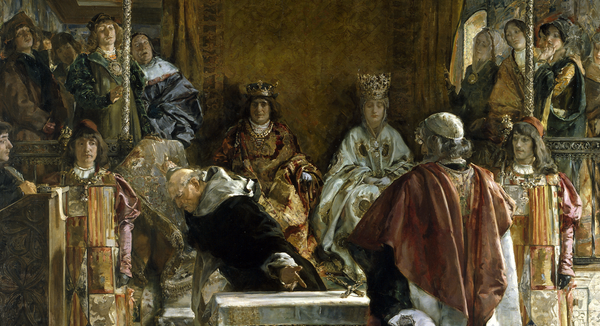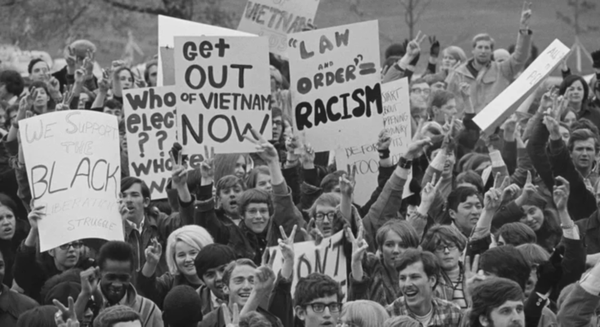Can Citizenship Be Revoked?
...the solution to America’s problem is the official annulment of the promissory vow of citizenship to the extent to which it was unlawful, while maintaining good faith for the vow to the extent that it was lawful.

Introduction: What is Citizenship?
A proper discussion of naturalization and denaturalization must begin with a definition of 1) the state, and 2) citizenship therein. A state is brought into existence by the communal investment of individual latent political power into offices. When this happens, a body politic is formed. A government is maintained over generations because the children of the founders (originating as they do, as propertied extensions of the founders themselves, and the inheritors of their estate) contribute their own latent political power to the same offices they were born under, in a type of implied consent, and this process is repeated continually for the duration of the office. A citizen, therefore, is defined as someone who contributes their latent political power, by explicit or implicit consent, to the offices of that state. A non-citizen may be subject to the jurisdiction of the state, but not contribute to the magisterial offices in that way (a visiting tourist or mere resident, for example). It is not the purpose of this essay to defend these definitions, but rather to set them forward as the foundation on which the rest of the essay is built.
I. The Weight of the Offer of Citizenship, and its Duties and Privileges
There is a promissory element to citizenship, because the magisterial offices are formed for the sake of mutually beneficial defense of life and property, yet in a distinctly communal sense. The state can be said to be the arbiter (in conjunction with the natural law) of the individual’s obligations to the common good of the polity.1 That being noted, as a steward of the common good, the state must also always act in the best interest of those whom it represents. Consequently, all citizens are liable to the cost, and privileged to the benefits, of their state.
Though citizenship is automatically conferred upon the children of citizens, it is theoretically possible to offer citizenship to others, if it is in the best interest of the political body.
The light of nature, further bolstered by the English legal tradition, teaches us that a contract carries the binding force of a vow, even if expressed informally. In law this is known as the principle of Offer and Acceptance. Contained within the offer is the conditional guarantee of delivery of the sale, and within the acceptance is contained the guarantee of delivery of the currency of purchase. In moral terms, what is contained in the offer of citizenship is the offer of the benefits of formal entry into the political body, upon the somewhat open-ended condition of complying with the rigors and demands of the same. If the offer is lawfully extended, and the offer is accepted, then the offeror has bound himself to delivery of what was offered. The state, as the arbiter or trustee of the common good, is authorized to offer citizenship.
II. Is the Vow of Citizenship Always Binding?
If the offer of citizenship is of the nature of a binding promissory vow, offered by a body empowered for that task, how then can there be any talk of denaturalization?
A good place to start is in the Westminster Confession, particularly as to when a vow is not lawful (22. 7):
No man may vow to do anything forbidden in the Word of God, or what would hinder any duty therein commanded, or which is not in his own power, and for the performance whereof he hath no promise or ability from God. In which respect, Popish monastical vows of perpetual single life, professed poverty, and regular obedience, are so far from being degrees of higher perfection, that they are superstitious and sinful snares, in which no Christian may entangle himself.
It is this principle, “[anything] which is not in his own power”, where the answer to our question lies. To this end, Samuel Rutherford in Lex Rex (Q. 17, Assertion 1) is very helpful:
The King is more properly a tutor than a father. 1. Indigency is the original of tutors — the parents die; what then shall become of the orphan and his inheritance? He cannot guide it himself, therefore nature devised a tutor to supply the place of a father, and to govern the tutor; but, with this consideration, the father is lord of the inheritance, and if he be distressed, may sell it, that it shall never come to the son, and the father, for the bad deserving of his son, may disinherit him; but the tutor, being but a borrowed father, cannot sell the inheritance of the pupil, nor can he, for the pupil's bad deserving, by any dominion of justice over the pupil, take away the inheritance from him, and give it to his own son. So a community of itself, because of sin, is a naked society that can but destroy itself, and every one eat the flesh of his brother; therefore God hath appointed a King or governor, who shall take care of that community, rule them in peace, and save all from reciprocation of mutual acts of violence, yet so as, because a trust is put on the ruler of a community which is not his heritage, he cannot dispose of it as he pleaseth, because he is not the proper owner of the inheritance.
Citizen migration (defined as the movement of foreigners seeking the offer of citizenship) meets the standard of disinheritance when (1) the new immigrants violate the Cost/Benefit Principle of immigration, considered as their contribution to the state (the lesser metric), and their qualitative impact on the citizenry (the greater metric), and (2) there was never any sort of valid political process necessary for the citizens of the state to “sell” their union (or even merely a portion of it), which is the only way that the national inheritance can be sold (for further details on this second point, see Question 17 in Ch. 44 of Lex Rex). If the principle above, that a magistrate is most properly a tutor-like figure, provided by God via the people themselves for the government of their life and property (and not an owner of it that he may sell it at will), then he is quite literally outside the scope of his authority to extend a promissory offer of citizenship to those who are a net-negative to the country to which they are immigrating. The logic here is important to follow. It cannot be argued that the promissory offer made by the magistrate is invalid merely because it is sinfully offered (though it is); however, the vow can be ruled invalid if it was offered by a party to “which [it] is not in his own power.”
III. What About the Gibeonites?
For a Christian reading what was just written, an objection may come to mind regarding the Gibeonites: not only was the vow made to them by Joshua entered under dismal circumstances (deception), but the vow was upheld by God, when Saul’s sons had to die for their father’s violation of it.
There is a degree of discrepancy on this question among trusted commentators. While there is some agreement between them (for example, that a vow is binding even if it comes at great cost) there is a fundamental disagreement as to why the Gibeonites could have been spared in this scenario.
The disagreement appears to arise over (1) on what grounds the keeping of the vow could be considered innocent, and (2) the root of the lawfulness of the Gibeonites’ perpetual enslavement. All parties agree that the vow itself (on Israel’s part) was entered into sinfully and as the result of being sinned against; however, that does not nullify a vow. Vows are still enforceable when entered under duress or deception, because God’s name is invoked in the making of it; additionally, to break such an agreement would be a form of lying (the principle being that we may not commit one sin to repair another one). Also, we know that God considered both courses to be valid, because while he punished Saul for breaking the vow to the Gibeonites, he declined to punish Israel for enslaving them.
Matthew Henry convincingly argued that the vow to the Gibeonites, though entered sinfully due to negligent incredulity and a failure to consult God, was at its root lawful due to their outward repentance. Henry also argues that the enslavement, and the severity of it, was not directly due to the Canaanite’s racial doom (to which a fuller sort of mercy might have been available if they had repented honestly) but rather a direct punishment for their deceit:
Thus, their lie was punished; had they dealt fairly and plainly with Israel, perhaps they would have had more honorable conditions granted them, but now, since they gain their lives with ragged clothes and clouted shoes, the badges of servitude, they are condemned for ever to wear such, so must their doom be.
There are two relevant observations from this passage. The first is that there is no indication that the Gibeonites were in any way detrimental to the Israelites outside of their religion, and therefore a conversion could have made them a suitable addition to the national body. This means that this passage cannot be used as a proof text against the standard set in section II. Secondly, it demonstrates that vows can sometimes be partially valid and partially invalid, and thus we should be cautious when deciding how to remediate a situation like unjust immigration that has been brought about by imperfect vows.
IV. Application
An alien has no moral nor constitutional right to retain the privileges of citizenship.
—Johannessen vs. United States (1912)
Legal immigration in the United States, considered generally, fails the standard set in section II, meaning that it falls outside of the power of the magistrate to extend. That being noted, the state has a lower standard to meet when it comes to approving immigration if the ones coming in are not offered integration into the political body; it is permissible to take them in as long as they perform some sort of function to the state that outweighs whatever difficulties they cause, because they do not have the same privileges as citizens and thus do not qualitatively impact the nation the way new citizens would. Therefore, the solution to America’s problem is the official annulment of the promissory vow of citizenship to the extent to which it was unlawful, while maintaining good faith for the vow to the extent that it was lawful.
To this end, a settlement, in the vein of Joshua 9, is called for. At the very least, most “legal” immigrants should be recategorized as mere residents. There also needs to be some sort of sense in which these residents bear a heavier and more servile burden in supporting the state, because it is fitting that the native receive priority over the stranger in terms of national privilege. My suggestions to this end include an elevated income tax obligation, a limit on real estate ownership, and the loss of the ability to hold public office or vote. For most of these people, there should also be government programs explicitly encouraging self-deportation.
Addendum: So-called “legal immigrants” have been the subject of this article; their case is more complicated, due to the vows extended to them. Illegal immigrants have never been the recipient of any such vows, and they can be summarily deported.
Footnotes
- If this were not true, then how could a state justify taxes (Rom. 13) or conscript an army in time of necessity? If the government could not command personal loss for communal interest, none of this would be lawful.





